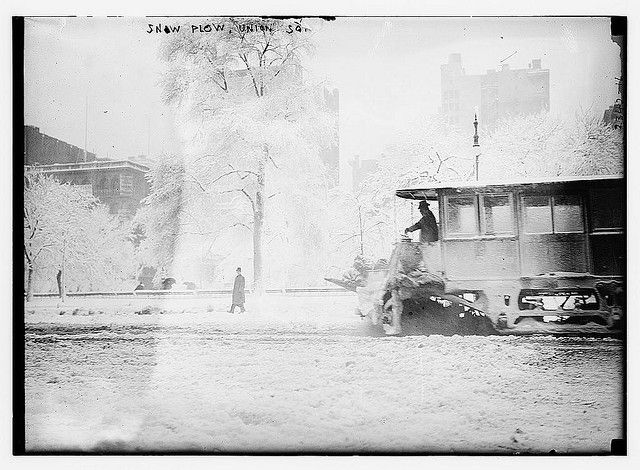Last-Minute NYC Holiday Gift Guide 🎁
We’ve created a holiday gift guide with presents for the intrepid New Yorker that should arrive just in time—


1700s: While the information on the snow conditions of the 1700s is not overflowing as we’d hoped, we know for a fact that The Great Snow of 1717 dumped three to four feet of snow all over our city. At this time, the city had no formal means of snow removal—New York was truly a jungle. The snow was so deep that it was impossible to travel from New York to Boston. The only successful traveler ditched his horse drawn carriage for snowshoes. Since snow was really only removed when it was melted, travel was almost entirely done by foot.
1800s: The notion that it’s the city’s responsibility to clear snow is a relatively new concept. Fifth Avenue and the area around City Hall were the only streets cleared because dozens of men would have to go into the streets and shovel for themselves. In New York, the job of clearing the snow was up to the police until 1881, when the Department of Street Cleaning was founded. Because of the condition of 19th century city government, the job frequently fell under the hands of corrupt officials, who would demand money and favors in turn for shoveling snow in front of a particular business.
The 19th century also saw a record-breaking snowstorm in 1888, nicknamed the Great White Hurricane. New York saw 20-60 inches, and the deaths of at least 200 people. The main problem with this snowstorm was that telegraph wires were crushed by the snow, thus making New York virtually isolated. “And in the weeks it took the city to dig itself out, the chronic inadequacies of the municipal system for clearing streets, whether of snow or garbage, became even more painfully clear,” Robin Nagle explains in her book, Picking Up: On the Streets and Behind the Trucks with the Sanitation Workers of New York City.

After this snowstorm, the city finally realized that they should buckle down on snow removal and start to plow during, not after, a storm. This was also when the city began to bury telegraph (and later telephone) wires underground, so this doesn’t ever happen again:
The 1800s also saw a development of the first snow plows, which were attached to horses. They were patented in the 1840s. It took a few decades for the horse plows to catch on, but once they did, they weren’t quite accepted with open arms. Plow companies were even faced with lawsuits because the plows would create backlogs and uneven mounds on side-streets. Plowed streets were often still full of snow.
Turn of the Century: Snow removal met its maker when George E. Waring became commissioner of the department of street cleaning. Waring, in the spirit of progressivism, considered snow removal a necessity, not a luxury. He created a unit of white uniform-clad men who would clear the snow systematically. Waring’s street cleaners would also march through the city streets in uniform, with him at the front on horseback!
The only problem Waring faced was that his uniformed snow-removers didn’t remove snow from all five boroughs. He did, however, come a very long way from when people had to fend for themselves in knee-deep snow!
Progression into the 20th century saw a development in snow removal technology. The first dump truck/motorized snow plow was unveiled in New York in 1913. As cars and trucks became more advanced through the decades, snow removal became a more organized and technological effort.

Image via Library of Congress
For more on snow, check out this in-depth story of the “Great White Hurricane” of 1888, and the 1947 storm which broke the “hurricane’s” record.
Subscribe to our newsletter